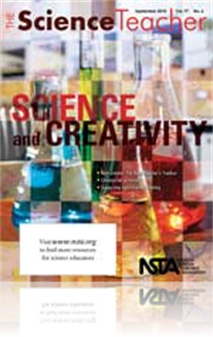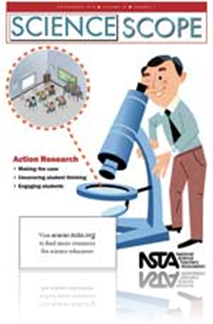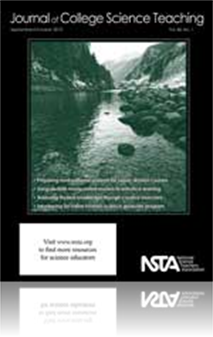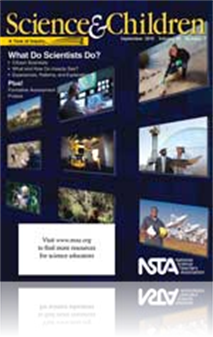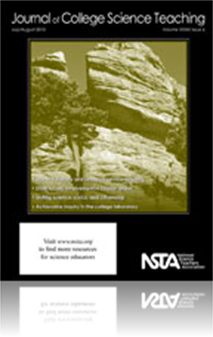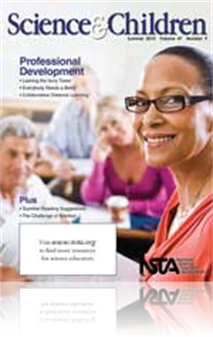All Resources
Journal Article
Encouraging Creativity in the Science Lab
Although science is a creative endeavor (NRC 1996, p. 46), many students think they are not encouraged—or even allowed—to be creative in the laboratory. When students think there is only one correct way to do a lab, their creativity is inhibited....
Journal Article
Editor’s Corner: Create and Innovate!
Just as changes in music delivery have radically altered the music business, dramatic changes in the workplace have required rethinking the way our schools work. To develop 21st-century skills, we must create classrooms that foster creativity and enc...
Journal Article
Scope on the Skies: The law of location
This article explains how the sky would look from different locations, specifically from other locations within our solar system. Answers to the following questions are addressed: Do the constellation patterns we see from Earth look different from an...
Journal Article
The New Teacher’s Toolbox: Conquering the “So What Now?” Moment
The first years of teaching can be tough: Getting to know a new school, new students, and what really works in the classroom can be a lot to handle! In this new column, Michael Romano shares some insight from his first years of teaching—and some ti...
Journal Article
What savvy shopper does not love a sale? A big sign announcing “25% off” will catch your eye and make you think about buying it, even if the item is something you don’t need. How much more compelling, then, if this announcement appears on one o...
Journal Article
Experiences, Patterns, and Explanations
In an activity sequence that took place over several days, the class learned about sound and how people hear sounds. Following each activity, students engaged in whole-group sharing sessions and individual journal-writing sessions that were designed ...
Journal Article
Using an adapted version of a recently published scientific article, a group of sixth graders worked together identifying conclusions, deciding on appropriate evidence, suggesting improvements for the study, and recommending further investigations fo...
Journal Article
Science Sampler: Motivating middle school students to monitor and assess their learning
Our job as teachers is not only to teach science, but also to instill motivation for learning in our students. After many trials and failures, the author came upon a process to motivate most middle school students. The process consists of an initial ...
Journal Article
Uncovering Student Thinking in Science Through CTS Action Research
Curriculum top study (CTS) action research is a specific type of inquiry that combines curriculum topic study (Keeley 2005) with an examination of students’ thinking using formative assessment probes (Keeley, Eberle, and Farrin 2005; Keeley, Eberle...
Journal Article
Teaching through Trade Books: Mysteries of the Past
Paleontologists, scientists who study the history of life on Earth, work in a dynamic area of science. Think of putting together a jigsaw puzzle with most of the pieces missing—that’s what creating the fossil record is like. Each time a new piece...
Journal Article
Editor’s Roundtable: Need an answer? Research it yourself!
Action research can have a powerful impact on your classroom practice because you don’t have to scan through document after document to find solutions to your problems. Instead, you will develop solutions by analyzing the data you collect. Let the ...
Journal Article
Message from the NSTA President: Imagine and Invent—Create a Great Future
The time is right for an emphasis on imagination and innovativeness in science education, both in students and in teachers. Change now dominates our economy and culture, and can only be realized through imagination and creativeness. Therefore, our ne...
Journal Article
Most children enjoy being in gardens. To capitalize on this interest, the authors designed a pea project in which second- and third-grade students would discover how plants grow under different conditions while also developing observation and nonfict...
Journal Article
Science Sampler: From speaking to writing in the structured English immersion science classroom
In most cases, structured English immersion (SEI) has replaced bilingual and English as a second language (ESL) programs as the preferred method of educating English language learners (ELLs). As a result, science teachers need specific strategies to ...
Journal Article
A Journal-Club-Based Class That Promotes Active and Cooperative Learning of Biology
A journal-club-based class has been developed to promote active and cooperative learning and expose seniors in biochemistry and cellular molecular biology to recent research in the field. Besides giving oral presentations, students also write three p...
Journal Article
Diagrams and figures play a central role in science and science education. Research has indicated that, when presented and used properly in a classroom setting, these external representations can contribute to students’ understanding of scientific ...
Journal Article
Message from the NSTA President: Imagine and Invent—Create a Great Future
The time is right for an emphasis on imagination and innovativeness in science education, both in students and in teachers. Change now dominates our economy and culture, and can only be realized through imagination and creativeness. Therefore, our ne...
Journal Article
It is no secret that many high school students are fascinated with automobiles. The activities in Fueling the Car of Tomorrow—a free high school science curriculum, available online—(see “On the web”)—capitalize on this heightened awareness...
Journal Article
Students—and just about everyone else—tend to have a wide range of misconceptions about microbes. This article is aimed at changing how students view microbes by engaging them in two hands-on activities that are fun and creative and align with bo...
Journal Article
Editor’s Note: A Year of Inquiry
The importance of developing the abilities to conduct and understand inquiry cannot be overstated. Acquisition of inquiry strategies will prepare students to encounter and solve problems and questions throughout their lives. By developing a more comp...
Journal Article
Point of View: Dissecting Motivation—The Will-Skill-Thrill Profile
Teaching is not talking. Teaching is creating an environment where learning happens. Effective teaching is creating an environment where maximum learning happens for every student. This requires acknowledging the complexities of intrinsic motivation ...
Journal Article
Lights, Camera, Action . . . It’s <em>Science Friday</em>!
Science Friday’s motto “Making Science User-Friendly” was the authors’ inspiration, as was its format for a segment on the morning broadcast at Forest View Elementary School. Patterned after National Public Radio’s Science Friday, this spec...
Journal Article
Forensic science education has evolved as an interdisciplinary science that includes medicine, chemistry, biology, and criminal justice. Therefore, multiple paths can lead to a career in forensic science. A formal education usually requires the stude...
Journal Article
Natural Resources: What’s Bugging You?
Unless they are biting us—or wowing us in some way—insects are often overlooked, despite vastly outnumbering us and being vital to our existence. Fortunately, there are many ways to focus the curiosity of children about insects and get some quali...
Journal Article
In this article, a comparison of student learning outcomes is made in sophomore-level physical science classes using a “traditional” pedagogical approach versus a “modern” approach. Specifically, when students were taught the electromagnetic ...
Journal Article
Did you catch it this spring? Less virulent than influenza, but almost as common. Some call the syndrome “Teacher Too Long Inside.” Fortunately, there’s a cure. While you’ve been nurturing, educating, and completing paperwork inside, the revi...
Journal Article
Favorite Demonstration: Throwing the Dice—Teaching the Hemocytometer
One of the concepts taught to our science students is the use of hemocytometer. Students in microbiology, genetics, and anatomy and physiology (A&P) classes use the hemocytometer in a variety of activities. In microbiology and genetics classes, it is...
Journal Article
Every Day Science Calendar: July (2010)
This monthly feature contains facts and challenges for the science explorer. ...
Journal Article
Methods and Strategies: Lessons From Portugal
Portugal has long been touted as a popular destination for savvy travelers, but now educators are touting it as something else—a professional development (PD) powerhouse for inquiry-based science! This article describes Portugal’s ongoing efforts...



